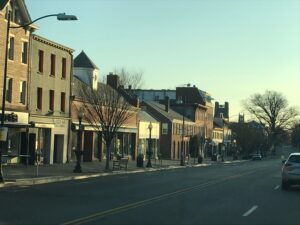 A so-called liberal town, located halfway between New York City and Philadelphia, Princeton prides itself as being open-minded, made up of academics and professionals, passersby and lifers, of all nationalities and colors. Princeton, originally named Prince-town in the late 17th century, was the capital of our country for 4 brief months in 1783. But, as we’ve learned through the history of our forefathers and other national leaders, political standing doesn’t always mean political correctness. When it comes to being welcoming to others, do Princetonians do better or worse than their fellow Americans with regards to their biases and judgements? It turns out, it’s a little of both.
A so-called liberal town, located halfway between New York City and Philadelphia, Princeton prides itself as being open-minded, made up of academics and professionals, passersby and lifers, of all nationalities and colors. Princeton, originally named Prince-town in the late 17th century, was the capital of our country for 4 brief months in 1783. But, as we’ve learned through the history of our forefathers and other national leaders, political standing doesn’t always mean political correctness. When it comes to being welcoming to others, do Princetonians do better or worse than their fellow Americans with regards to their biases and judgements? It turns out, it’s a little of both.
Merriam-Webster defines a bias as “a personal and sometimes unreasoned judgment.” And unfortunately, most people have some. The result is whether we care to learn more about each other and support those that are different than us, or if we let those judgements affect our interactions and harm others.
“Most people find it easy to see our differences, because typically they are obvious and involve our appearance,” explains Princeton Police Department (PPD) Chief Christopher Morgan. “We want our officers to take a moment to talk and listen to others, because more often than not, we discover how we’re closer to being the same than we are different.”
This sentiment extends far beyond the police department, though not everyone shares it. So far in 2021, the PPD has documented 9 different cases of bias incidents (though it should be noted that 3 of them were perpetrated by the same person at one time). Five of the incidents were harassment, three criminal mischief and one was cyber harassment. Additionally, a preliminary report from the New Jersey Office of the Attorney General shows 140 bias incidents throughout Mercer County last year, the 3rd highest number in the state. Anti-Black, anti-Jewish and anti-gay were the most common types. You can see the full report here.
It’s important to note that data doesn’t always tell the full story, as often victims of bias attacks are too afraid or uncomfortable to report them.
BIASES BASED ON RACE
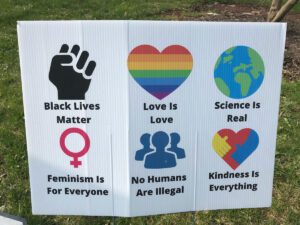 47% of all bias incidents reported in Mercer County last year were against Blacks, the largest percentage of bias incidents overall, against a group that makes up only 21% of the county population. In Princeton, Blacks comprise 5.5% of the population.
47% of all bias incidents reported in Mercer County last year were against Blacks, the largest percentage of bias incidents overall, against a group that makes up only 21% of the county population. In Princeton, Blacks comprise 5.5% of the population.
“I know as a person of color there are issues here, but on a personal level I feel welcome,” says Leighton Newlin, who was born and raised in Princeton and has lived here as an adult since 1996. “The issue with bias and because it is everywhere is what you do with it. You can either react to it or you can allow it to motivate you, to break through barriers and to use your voice, actions, attitude, intellect and insight to show people why them being biased is not a truthful reaction to what they’re seeing.”
To fight bias, Not in Our Town Princeton seeks to promote inclusive communities. Board Member Shirley Satterfield, a 6th generation Princetonian, says the need for organizations like this show that biases still exist, but she never felt them in her younger days as a Black girl in town.
“I felt welcomed in this community because our community was segregated. I went to the Princeton School for Colored Children, we had a self-contained neighborhood. I didn’t know anything about biases until they integrated the schools.”
Since integration in the 1950s, teachers and others had to be educated to know how to work together. Four years ago, Satterfield started the Witherspoon-Jackson Historical and Cultural Society. Beyond preserving the history of African Americans in Princeton, the society aims “to partner with the diverse community organizations, businesses, and town officials to promote awareness, education and interest in Princeton’s African-American heritage in tandem with the present and future development of the town of Princeton.”
Such historical education is part of the movement to help advance racial literacy and understanding in Princeton. More specifics of education and awareness are detailed in Has this Past Year of Racial Awareness Led Princeton to Change?, also in this issue of Princeton Perspectives.
When it comes to the Hispanic community, more than 100 bias incidents were noted in Mercer County last year, making them the 4th most reported in 2020. However, in Princeton and neighboring towns, it’s not just incidents that affect people.
“There is a bias with Hispanics in terms of we are seen as an afterthought. People think of that community that needs something instead of that community that also contributes,” describes Ana Paola Pazmiño, Director of Unidad Latina en Acción NJ, whose organization works to empower, organize and educate the community. “Most of our Hispanic leaders, which I’d call Latinos or Latinx, are striving and also wanting to fit, to be part of the community. To not be that afterthought. One of the ways is obviously learning the language. I’ve seen many of our community leaders forcing themselves to go to ESL classes, making sure their children are also involved in school activities so they can feel a part of the community.”
Pazmiño says there is a bias and racial tension felt in the community right now when it comes to vaccinations, for those being asked to show ID that might not have a resident card or Passport. She says the ability to get a vaccine is also troubling.
“There’s the lack of language justice for making sure the information is going out in Spanish and English, a lot of the how-to and access for those that are farm workers, working all day and only have nighttime, so their access to vaccinations is nearly impossible and there’s not a specific way to get it through their employer.”
People of other backgrounds are also feeling tension this past year. There were nearly 70 bias reports each against Asians, Whites and other races.
Xiaobing Li, an Asian American Princeton resident, says there is a common stereotype that Asian Americans are not Americans but rather “outsiders” or “guests” and not an integral part of the community.
In late March, the local “Stop Asian Hate” rally gathered hundreds at Princeton’s Hinds Plaza, denouncing recent murders of Asian Americans and calling for better understanding and education of Asians in our country – hoping it will help remove stigmas and biases. To that end, the organization Make Us Visible NJ is advocating for the meaningful inclusion of Asian American and Pacific-Islander (AAPI) studies in NJ public schools. You can read more about specific struggles Asian American’s encounter by clicking on the The Invisible Asian Americans article in this issue.
While thankfully there have not been any recent violent attacks in our area, local Asian families say the pandemic has brought about comments, including students taunting their children in school hallways and classrooms.
“You may have read the news about a Princeton High School freshman’s comments in one of the BOE meetings in March. He was born and raised in the U.S. and has been residing in Princeton schools for years, but his classmate at the middle school questioned him about if he eats dogs and shoved an umbrella to his face ‘to keep the corona away’,” retells Li. She also recalls another incident at the rally in March. “When the volunteers were setting up banners and tables for the rally at Hinds Plaza, two white elder ladies came over and accused the volunteers of ‘spreading hate’ and threatened to write to the local authorities to report the rally organizer.”
BIASES BASED ON RELIGION
Like the taunts mentioned above, local religious bias incidents tend not to be violent but more acts of intimidation. Anti-Semitism (prejudice against Jews) is the most common form of anti-religious bias in the United States.
“Most anti-Semitic acts, other than in ultra-orthodox areas, are basically vandalism. Words, swastikas on the ground or a building, a flyer written out,” explains Mark Merkowitz, Executive Director of Jewish Federation Princeton Mercer Bucks.
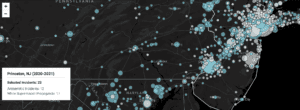
Since January 2020, the Anti-Defamation League reports there have been 17 instances of White Supremacist propaganda targeting Jews in Princeton. There were also a dozen incidents of anti-Semitic vandalism and harassment in Princeton in 2020. They include Swastika graffiti that was found on a Jewish family’s mailbox and on the Princeton University campus, pornographic images disrupting a synagogue’s Zoom Shabbat prayer service, and an image of Hitler appearing during a virtual class.
It is difficult to find localized numbers when it comes to religion, but The Pew Research Center data states that 67% of adults in New Jersey are Christian, 3% are Muslim, 3% Hindu, and fewer than 1% are Buddhist. The largest minority religion in the state is Judaism, noted as 6% of the adult population.
At Princeton University (PU), there have been 10 religious bias reports on campus so far during the 2020-2021 school year (note, students were not on campus until 2nd semester). The incidents, which involved the use of visual symbols and unwelcomed speech, were anti-Semitic (4), anti-Muslim (4), and against Christianity and Scientology (2).
“At Princeton, we define bias as a broad category of behaviors including discrimination, harassment, and other actions that demean or intimidate individuals or groups because of personal characteristics, beliefs or expression,” shares Michael Hotchkiss, PU Deputy Spokesperson. “We acknowledge that more incidents may occur than are reported. Nonetheless, we take all reports of bias seriously and respond in appropriate ways based on the context and circumstances presented and in light of the University’s principles of freedom of expression.”
BIASES BASED ON SEXUALITY
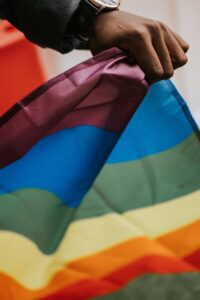 The number of anti-gay, lesbian, bisexual or transgender bias incidents increased in Mercer County from 2019-2020. While no one person can speak for all, there appears to be a sense of acceptance for gender differences in town.
The number of anti-gay, lesbian, bisexual or transgender bias incidents increased in Mercer County from 2019-2020. While no one person can speak for all, there appears to be a sense of acceptance for gender differences in town.
“I have seen LGBTQ+ people embraced in a number of settings, including political events, houses of worship, fundraisers, and festivals,” states Nick DiDomizio, a white cis gay male that has lived in Princeton for about 6 years. “But I know that BIPOC transgender and non-binary members of our community are still struggling to find acceptance.”
The LGBTQ+ liaison to the Princeton Civil Rights Commission since 2019, DiDomizio says LGBTQ+ complaints with regards to bias and discrimination would be brought to the commission but hate crimes would be directed to the police.
“I can’t say I have heard of any instances personally in my relatively short tenure here in town. I know that Princeton University used to be less of an accepting place, but many attitudes within the administration have changed. I’ve also heard testimonials from folks during the Princeton Community Pride event that they would never have felt comfortable showing public displays of affection decades ago, but they feel like it is much better now,” DiDomizio adds.
Princeton Public Schools has shown support for the LGBTQ+ community by assigning gender neutral restrooms, creating LGB and transgender protections in its policy and by hiring folks like Princeton Unified Middle School (PUMS) guidance counselor Thomas Foley, who also helps lead professional development for the district on how to best support LGBTQ+ students. In his role, Foley started the Sexuality and Gender Alliance (SAGA) at PUMS as a support and advocacy group for middle school LGBTQ+ students and their allies, which also educates all students about their community.
“I often cite the CDC who has put out messaging stating that just the existence of a club like SAGA in schools decreases rates of harassment, intimidation, and bullying in schools, decreases rates of student depression, and increases student attendance,” Foley shares. “The students at PUMS know that they are valued and loved no matter their sexual orientation or gender identity. Teachers report that more kids than ever are comfortable coming out and sharing these pieces of themselves and the students are very accepting of one another. It is a beautiful thing.”
Outward, intentional attacks with regards to sexuality are not common at the middle school, but Foley says unintentional micro-aggressions do occur.
“Micro-aggressions include telling students they are “too young” to speak on topics related to gender and sexuality, assigning students into groups based on gender, perpetuating stereotypes by making assumptions about people based on characteristics they exhibit, etc,” explains Foley. “Additionally, students have reported to me use of the word “gay” as meaning “weird,” “dumb,” etc. in the form of “that’s so gay.” This used to be far more common, but I’ve noticed that with SAGA and with the progression of our society as being more inclusive, hearing “that’s so gay” is also rarer these days but does still occur, according to my students.”
OTHER LOCAL BIASES
It is impossible to address them all in one article, but biases don’t start and end with race, religion and sexuality. As one local resident points out, Princetonians often share strong judgements when it comes to Princeton Charter School (PCS) families.
“I believe in public schools,” says a former PPS parent whose family transferred to PCS from a PPS elementary school for what they feel was a better fitting environment. Speaking on the condition of anonymity, the parent added “I had no idea that in Princeton if you send your child to Charter you, as a person, are going to be questioned and there will be a great deal of social ostracism and condemnation directed your way. There’s an incredible bias and you are considered ‘One of those parents’.”
There has been tension between PPS and Charter families since Charter’s inception in 1997 when, according to the website, it was created by a group of parents seeking “high academic standards” for the children in town. A few years ago, when PCS sought expansion, the feelings of many PPS parents grew even more intense and their opinions were not only directed at the grown-ups.
“It got to the point for Charter parents, if you were sending your kid out to the park or store, you would not dress them in anything that identified them as attending Charter,” the parent recalls.
Many Princetonians against PCS would argue their opinions are not biased, they are judgements based on reasonable assessments. But the bias develops when the opinions extend beyond the existence of the school and are directed towards people – the families that attend or staff that work there, causing them to feel unwelcomed in town. Another group of people struggling with that feeling are those with conservative or Republican views. Some contend a town like Princeton, whose residents are predominantly Democrat and liberal, is a bit of an oxymoron, for to be liberal is to respect opinions that are different from your own.
“The fact that Republicans don’t even run for public office in this town speaks volumes to what the town feels about its viewpoints. This town had a mayor that ran unopposed, doesn’t that tell you everything you need to know about local government,” offered a local registered Republican, hesitant to share this point of view in public. “I feel that if I gave my true feelings on anything I’d be ostracized by my neighbors and friends, and that’s no way to live in a Democracy.”
Several conservatives in town shared this viewpoint with me, noting they have been called immoral, insensitive, and criminal for supporting Republican policy or having left-of-center beliefs.
COMMUNITY RESPONSE
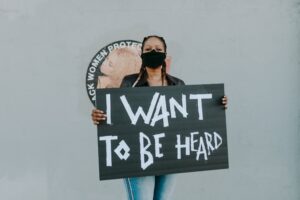 Working towards the betterment of our democracy is the Princeton Civil Rights Commission, helping to educate the community about implicit bias through outreach, community dialogues, community forums, seminars, focus groups and study circles.
Working towards the betterment of our democracy is the Princeton Civil Rights Commission, helping to educate the community about implicit bias through outreach, community dialogues, community forums, seminars, focus groups and study circles.
“We also offer the ability to put organizations into training for conscious and unconscious bias. We’ve worked very closely with the Attorney General’s office over the years because they also provide bias training, they’re a ready resource,” explains Princeton Civil Rights Commission Chair, Tommy Parker. “It’s community driven. We’ll act as moderators, but the emphasis, the push and delivery is going to come from community and community stakeholders.”
As part of the municipality’s bias training, the Civil Rights Commission has created a Racial Equity Tool Kit, that is to be used by municipal leaders, departments and groups to help position their thinking and pose questions they may not have thought of while devising new policies or programs.
“The community feedback has been very favorable and feedback from municipal leaders has been positive,” adds Civil Rights Commission Vice Chair, Sherrod Smith. “At this point we’re doing what we can to make sure it’s being considered and used by municipal officials to analyze and assess policies on the front end before it goes out and you have unforeseen issues that disproportionately affect a certain population.”
Civil Rights, as described by Britannica, provides “guarantees of equal social opportunities and equal protection under the law, regardless of race, religion, or other personal characteristics.” Biases can contribute to violations of civil rights. If someone in the community feels they’re not being treated fairly, complaints or desires for mediation can be filed through the Human Services office or directly to the Commission.
“The Civil Rights Commission would provide them with a list of mediators, not connected to the commission or municipality. They also have access, if the other steps don’t resolve things, to the NJ State Attorney General’s office, Civil Rights Division,” adds Parker.
Parker notes that in the past year there have been more and varied organizations coming to the commission to get involved or ask questions.
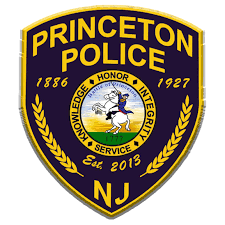 Amongst the organizations seeking to do better, is the Princeton Police Department, which is focused on proper training of its Police force.
Amongst the organizations seeking to do better, is the Princeton Police Department, which is focused on proper training of its Police force.
“We’ve included Implicit Bias training this year as well. All officers were required to attend that training and we promoted the idea of talking about our differences and putting just as much focus or more on taking the time to recognize our similarities,” shares Chief Morgan. “We’ve sent an officer, at her request, to attend the Cornell University Diversity and Inclusion training program. The program was such a success that another officer will be attending as well. Together, through our training program, we will be incorporating their lessons and sharing their information throughout the police department.”
Police officers nationwide have faced criticism of bias in the way they handle situations. The training is intended to open one’s eyes, to obtain a better understanding of others and of oneself to respond appropriately on calls and to determine if the incident at hand is a bias situation itself.
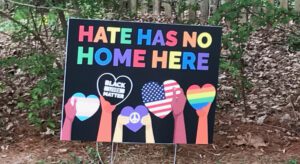 One can look at the numbers and say we are lucky, only 9 bias incidents have been reported so far this year in Princeton. Or, one can look and say even one incident is too many. Across town, lawn signs are posted stating “Hate has no home here.” Whether this is more hope or can become fact, time will tell.
One can look at the numbers and say we are lucky, only 9 bias incidents have been reported so far this year in Princeton. Or, one can look and say even one incident is too many. Across town, lawn signs are posted stating “Hate has no home here.” Whether this is more hope or can become fact, time will tell.

Lisa Jacknow spent years working in national and local news in and around New York City before moving to Princeton. Working as both a TV producer and news reporter, Lisa came to this area to focus on the local news of Mercer County at WZBN-TV. In recent years, she got immersed in the Princeton community by serving leadership roles at local schools in addition to volunteering for other local non-profits. In her free time, Lisa loves to spend time with her family, play tennis, sing and play the piano. A graduate of the S. I. Newhouse School of Public Communications at Syracuse University, Lisa was raised just north of Boston, Massachusetts but has lived in the tri-state area since college. She is excited to be Editor and head writer for Princeton Perspectives!
